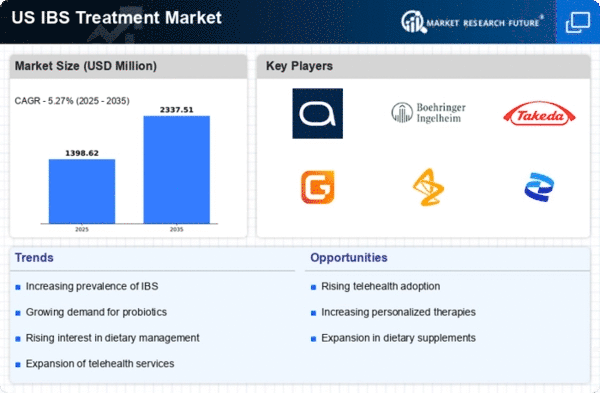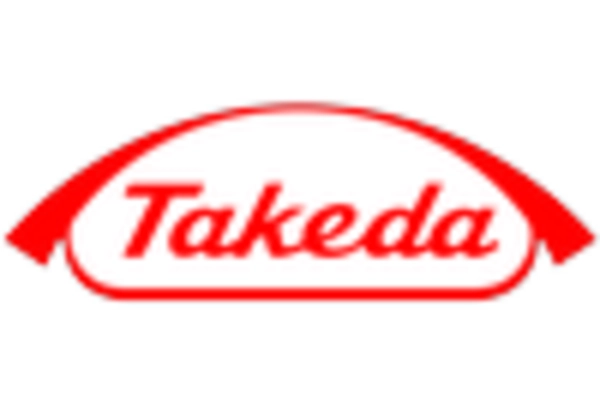Growing Prevalence of IBS
The increasing prevalence of Irritable Bowel Syndrome (IBS) in the US is a primary driver for the IBS Treatment Market. Recent estimates suggest that approximately 10-15% of the US population experiences IBS symptoms, leading to a heightened demand for effective treatment options. This growing patient population necessitates the development of innovative therapies and management strategies, thereby propelling market growth. As awareness of IBS expands, more individuals seek medical advice, contributing to the rising number of diagnoses. Consequently, healthcare providers are increasingly focusing on tailored treatment plans, which further stimulates the IBS Treatment Market. The financial implications are notable, with the economic burden of IBS estimated to exceed $20 billion annually in the US, encompassing direct healthcare costs and indirect costs such as lost productivity.
Increased Focus on Gut Health
The increased focus on gut health among consumers is significantly impacting the ibs treatment market. As awareness of the gut-brain connection grows, individuals are becoming more proactive in managing their digestive health. This trend is reflected in the rising popularity of probiotics, prebiotics, and dietary supplements aimed at improving gut flora. The market for these products is projected to grow at a compound annual growth rate (CAGR) of 8-10% over the next few years. Additionally, the food industry is responding to this trend by developing functional foods that promote gut health, further driving demand for IBS treatments. As consumers prioritize gut health, the ibs treatment market is likely to benefit from increased interest in holistic and integrative approaches to managing IBS symptoms.
Rising Awareness and Education
Rising awareness and education regarding IBS are crucial factors driving the ibs treatment market. Increased public knowledge about the condition has led to more individuals recognizing their symptoms and seeking medical assistance. Educational campaigns by healthcare organizations and advocacy groups have played a pivotal role in demystifying IBS, encouraging patients to discuss their symptoms with healthcare providers. This shift in perception is reflected in the growing number of consultations and treatment initiations. Moreover, healthcare professionals are receiving enhanced training on IBS management, which further supports effective treatment strategies. As awareness continues to grow, it is anticipated that the ibs treatment market will experience a corresponding increase in demand for various therapeutic options.
Integration of Telehealth Services
The integration of telehealth services is transforming the ibs treatment market by providing patients with convenient access to healthcare professionals. Telehealth platforms enable individuals to consult with specialists from the comfort of their homes, which is particularly beneficial for those with IBS who may experience discomfort during travel. This shift towards virtual consultations has been accelerated by technological advancements and changing patient preferences. As telehealth becomes more widely accepted, it is expected that more patients will seek treatment for IBS, thereby expanding the market. Additionally, telehealth can facilitate ongoing management and follow-up care, which is essential for chronic conditions like IBS. The convenience and accessibility of telehealth services are likely to enhance patient engagement and adherence to treatment plans.
Advancements in Pharmaceutical Research
Recent advancements in pharmaceutical research are significantly influencing the IBS Treatment Market. The development of novel medications, including targeted therapies and biologics, has expanded treatment options for patients suffering from IBS. These innovations are often backed by robust clinical trials, demonstrating efficacy and safety, which enhances physician confidence in prescribing these new treatments. Furthermore, the introduction of over-the-counter options has made it easier for patients to access relief, thereby increasing market penetration. The pharmaceutical sector is projected to invest heavily in research and development, with estimates suggesting an increase in spending by 5-7% annually. This investment is likely to yield new therapies that address the diverse symptoms of IBS, ultimately driving market growth and improving patient outcomes.
















